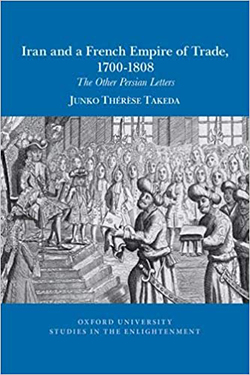Iran and a French Empire of Trade, 1700-1808: The Other Persian Letters
Junko Takeda
Oxford University Press, January 2021

In her new book "Iran and a French Empire of Trade, 1700-1808: The Other Persian Letters" (Oxford University Press), Syracuse history professor Junko Takeda explores the political, commercial, and cultural links between eighteenth century France and Persia. Her global microhistory reveals how trans-imperial trade impacted the lives of various entrepreneurs and mercenaries living on the edge of empire, while demonstrating how French engagement with the Asian continent shaped Enlightenment political thought and policy making across the Age of Revolutions.
Takeda begins by arguing how European arms and commodity trading exacerbated tensions among Turkey, India, Russia, and Persia, and worsened the effects of climate change and resource insecurities in these regions. She explores this dynamic by focusing on a colorful cast of characters who existed on the margins of the French state, and developed projects for Franco-Persian trade that ran contrary to the monarchy’s traditional partnership with the Ottoman Empire. Their activities, she claims, played an important role in transforming French ideas about Asia, empire and revolutions. While historians of France who have studied eighteenth-century political ruptures have traditionally ignored Asian politics, Takeda’s work offers a more global perspective that helps us reconsider the Age of Revolutions.
Historian Junko Takeda is an associate professor and Daicoff Faculty Scholar at Syracuse University’s Maxwell School of Citizenship and Public Affairs. Her research interests include early modern French statecraft, global trade and the history of disease and medicine. At Maxwell, she teaches a variety of lower and upper division courses, including graduate coursework in early modern Europe, the French Revolution and globalization. She is currently working on two monographs, a global microhistory of Avedik, an Armenian patriarch imprisoned in France under the reign of Louis XIV, and another project on the Franco-Japanese silk trade. In 2014, Takeda was named a Ronald O’Hanley Faculty Scholar, a title she held for three years.
Publisher's Summary:
"Iran and a French Empire of Trade" examines the understudied topic of Franco-Persian relations in the long eighteenth century to highlight how rising tensions among Eurasian empires and revolutions in the Atlantic world were profoundly intertwined. Conflicts between Persia, Turkey, India and Russia, and European weapons-dealing with these empires occurred against a backdrop of climate change and food insecurities that destabilized markets.
Junko Takeda, professor of history, shows how the French state relied on “entrepreneurial imperialism” to extend commercial activities eastwards beyond the Mediterranean during this time, from Louis XIV’s reign to Napoleon Bonaparte’s First Empire. Organized as a collection of microhistories, her study showcases a colourful set of characters—rogue merchants from Marseille, a gambling house madam, a naturalized Greek-French drogman, and a bi-cultural Genevan-Persian consul, among others—to demonstrate how individuals on the fringes of French society spearheaded projects to foster ties between France and Persia.
Considering the Enlightenment as a product of a connected world, Takeda investigates how trans-imperial adventurers, merchants, consuls, and informants negotiated treaties, traded commodities and arms, transferred knowledge, and introduced industrial practices from Asia to Europe. And she shows the surprising ways in which Enlightenment debates about regime changes from the Safavid to Qajar dynasties and Persia’s borderland wars shaped French ideas about revolution and policies related to empire-building.
Related News
Commentary

Mar 7, 2025
Commentary

Mar 6, 2025

